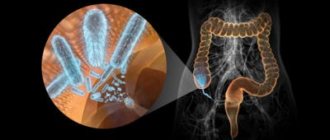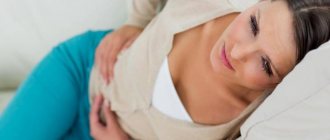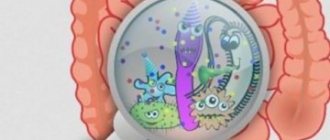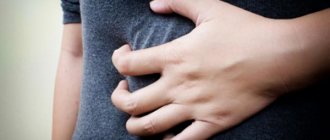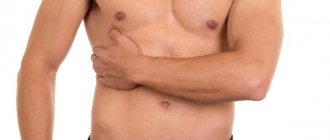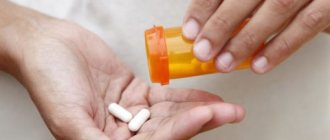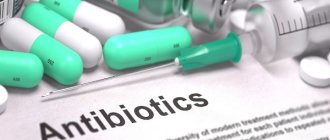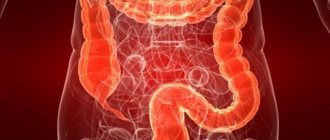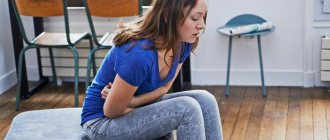The effect of antibiotics on the intestines
There are quite a lot of myths about the effect of antibiotics on the children's body. In this section we will only talk about those facts that have an evidence base, that is, confirmed by scientific research. Most modern antibiotics for oral administration, especially those prescribed for home use, do not cause any irreparable harm to the child’s body.
If, after a course of medications, the body recovers correctly (first of all, a diet is necessary), then the intestinal function will completely normalize on its own within 5-12 days.
A number of medications can shorten and alleviate this period, but if there are no other reasons for diarrhea, then it gradually disappears on its own.
It should be borne in mind that there are a number of drugs that can actually disrupt not only the balance of microflora in the intestine, but also cause inflammation in the form of pseudomembranous colitis. These include:
- Amoxicillin
- Trimethoprim
- 2nd and 3rd generation cephalosporins
- Clindamycin
- Nitrofurantoin
These drugs are prescribed only for strict indications and, as a rule, are not used to treat children. The disease occurs in less than 1% of people taking medications (long-term) and often occurs in combination with other diseases of the digestive tract. It is pseudomembranous colitis that doctors call antibiotic-associated diarrhea, although it is the least likely cause of diarrhea after taking medications.
Causes of diarrhea from antibiotics
If you follow all the rules for taking medications, side effects should be minimal, however, due to a number of reasons, diarrhea appears after antibiotics in a child:
- The main cause of diarrhea after antibiotics is overeating. During illness, children, as a rule, lose their appetite, so a large amount of food after the condition improves can cause indigestion. You should also not forcefully give food to a child during the illness itself, as this makes it difficult for the immune system to fight the disease. It is enough to feed the baby according to his appetite.
- Repeated use of an antibiotic can cause allergies, which include diarrhea. Most often, additional symptoms such as rash and redness occur.
- Diarrhea can be caused not by antibiotics, but by complications left over from the underlying disease. After the drug destroys dangerous bacteria, other microorganisms take their place, so it is necessary to restore the child after treatment as quickly as possible.
- Long-term therapy or exceeding the time limit for taking the drug. In addition to colitis, antibiotics reduce lactase activity in the intestines, which promotes fungal growth and can cause dysbiosis.
You cannot prescribe an antibiotic yourself, even if the same disease reappears. The risk of developing an allergy or digestive disorder to the same drug increases significantly, and the effectiveness of its use is noticeably reduced.
Diet as a method of treating diarrhea
To successfully cure diarrhea after taking antibiotics, it is necessary to approach the problem comprehensively. An important role in this scheme is assigned to diet correction. Without this point, the body’s recovery process can be significantly delayed. We wrote on this page what you can feed a child with diarrhea.
For children under one year of age who are breastfed, the ideal dietary option is only breast milk. But for this, the nursing mother will have to go on a diet with her baby. It is recommended to exclude from the diet all foods that, to one degree or another, can cause stool thinning. At the same time, it is advisable to add bananas, baked apples and rice to the menu.
We recommend: What to do if a child has watery diarrhea?
For artificial ones, it is recommended to prepare the mixture by diluting milk with water in a ratio of 1:2. After a day, you can switch to 1:1 proportions, provided there is a noticeable improvement in the child’s condition. You can return to your normal diet after two to three days.
For children over one year old who are already familiar with adult food, it is suggested to prepare dishes from potatoes, rice, buckwheat porridge and heat-treated vegetables. For treats, you can offer your child homemade crackers, dried apples and baked green apples.
If a child has diarrhea, it is forbidden to give any fermented milk products until the stool normalizes. Kefir and natural yoghurts are allowed only with confirmed dysbiosis, when the frequency of trips to the toilet is reduced.
Among folk remedies, we can recommend an infusion of dill seeds, a decoction of chamomile or black peppercorns without chewing. But first, consult a pediatrician so as not to harm the baby’s condition.
Features of the use of antibiotics
There are certain features in taking antibiotics, as well as the reactions they cause in the body. Parents need to know about them in advance in order to ask the necessary questions at an appointment with a pediatrician:
Methods of using antibiotics. Oral (oral) administration of drugs is not always necessary; when administered topically, intramuscularly or inhaled, the intestines and stomach are not affected.- It is necessary to accumulate the drug in the inflamed tissues, therefore different groups of antibiotics have their own distribution and concentration in the body.
- Each antibiotic (like any potent drug) has its own side reactions: from allergies to diarrhea.
- The prescription of antibiotics must be strictly justified, since they help specifically with bacterial infections, but with viral ones they are not only useless, but also suppress the body’s own defenses.
- Not all antibiotics can be used for small children, but there are special categories of drugs that are approved from 1 month of life.
Any antibacterial drug should be prescribed only by a doctor, taking into account all the characteristics of your child and his disease.
You should also not exceed or reduce the prescribed dose of the drug or the duration of treatment, this can lead not only to dysbiosis, but also to a serious complication of the underlying disease.
Diarrhea in newborns
The wider the spectrum of action of antibiotics, the more pronounced the side effect in the form of diarrhea.
Similar manifestations are observed even in adults, what can we say about children. In a newborn, the digestive system is just beginning to form and the baby has not yet acquired beneficial microorganisms that protect the gastrointestinal tract.
Diarrhea from antibiotics in young children is manifested not just by loose stools - streams of water come out of the baby.
The baby diarrhea often - after almost every feeding and between meals . Diarrhea is accompanied by vomiting, severe pain and fever. Even with a mild form, a small body quickly becomes dehydrated, which provokes serious consequences.
Diarrhea in a baby can also be caused by a mother taking antibiotics. Therefore, during treatment, women are advised to interrupt feeding so that potent drugs do not penetrate into the baby’s body along with milk.
Treatment
The main task of parents is not to stop diarrhea, but to maintain and restore bowel function. The use of antidiarrheal drugs and folk remedies without eliminating the cause of diarrhea is ineffective. If diarrhea is profuse, continues for more than one day and is accompanied by abdominal pain or a change in the color of the discharge, this symptom cannot be treated on your own; the child must be shown to a specialist. For children under one year of age, any medications are given only after consultation with a pediatrician.
Restoring water balance
The main help for a child with diarrhea is to restore the water-salt balance. In order not to lose too much fluid, Regidron, Glucosolan, and Humana Electrolyte are prescribed.
Rules of application:
- Regidron. The contents of the package are dissolved in a liter of water. Children under one year of age are given water from a pipette, and older children are given water from a spoon or given small sips.
- Glucosolan. Solanum and glucose are dissolved in 100 ml of water in a ratio of 1:4 (if in sachets and not in tablets, then in 1 liter of water). Drink 40 ml per 1 kg of body weight.
- Humana Electrolyte. For children under 3 years old, a preparation with fennel is suitable, and with a banana - for older children; additional components also have an astringent effect. Take according to:
- From birth to 6 months, 50 ml per 1 kg of body weight
- From 6 to 12 months up to 100 ml per kg body weight
- From one year and older, 150 ml per 1 kg of body weight
Use the medication until the diarrhea stops completely.
Sorbents
To remove bacteria, toxins and simply excess water from the child’s body, sorbents are used. Their main advantage is safety; almost all drugs are suitable even for newborns and pregnant women.
Basic drugs and rules for their use:
- Smecta. Dilute in a glass of water and take fractionally.
- up to 1 year - 1 package per day
- 1-3 years - 2 packages per day
- over 3 years old - 3 packages per day
- Microsorb P. Dilute in double the amount of water.
- 3 months - 1 year - 1/2 teaspoon x 2 times
- 1-5 years - 1 teaspoon x 2-3 times
- 5-14 years - 1 teaspoon x 3 times
- Enterosorb
- from birth to 5 years 1 teaspoon up to 3 times a day
- from 5 to 14 years 2 teaspoons up to 3 times a day
You should not take sorbents after symptoms have subsided; in children, with prolonged use they can cause constipation.
Probiotics
Regardless of whether diarrhea is caused by antibiotics or other causes, probiotics (preparations containing beneficial bacteria) can help shorten the duration of diarrhea and normalize intestinal microflora.
Never reduce the dosage of antibiotics on your own, otherwise they will not have the desired therapeutic effect on the bacteria. But microorganisms in the intestines that have adapted to it can cause not only prolonged diarrhea, but also chronic inflammation in the mucous membranes.
All probiotics are divided into two groups:
- preparations containing only lactobacilli and bifdobacteria, they are difficult to store and can lead to allergic reactions:
- lactobacterin
- bifidumbacterin
- Linux
- combined preparations that contain not only live bacteria, but also sorbents, vitamins and immunoprojectors:
hilak forte - bifacid
- bifidum forte
- biidok
- normase
For self-administration, you can take bifidobacteria and lactobacilli in the following dosages:
- Linex baby (during meals, mixed with water)
- from birth to 2 years - 1 sachet per day
- from 2 to 12 years - 2 sachets per day
- Hilak forte (diluted in a small amount of water)
- from 2 to 12 years - 20-40 drops x 3 times
- from 12 years old - 40-60 drops x 3 times
- Bifidum forte (package diluted with 5 teaspoons of water)
- up to 1 year - 1 package x 2 times
- 1-3 years—2 packages x 2 times
- over 3 years old - 2 packages x 3 times
- Normaze (contraindicated in children with galactose intolerance)
- up to 1 year -2.5 ml x 2 times
- 1-6 years —5.0 ml x 2 times
- 7-14 years -5.0 ml x 3 times
Take medications from this group for about two weeks, 3-40 minutes before meals. The dosage and exact duration of treatment are prescribed by the pediatrician after the degree of dysbacteriosis is determined (laboratory examination of the discharge).
Folk remedies
Folk remedies will also help normalize loose stools, such as:
- Rice water. Pour 50 g of cereal into 1 liter of water and leave for 6 hours, then the mixture is heated and crushed in a blender. Give 100 ml along with the main diet.
- St. John's wort infusion. Add a few tablespoons of dried herbs to a glass of boiling water. After 2 hours, the decoction is ready for use.
- Chamomile tea. Add 3 tablespoons of herbs to 500 ml of water and drink instead of tea.
- Apple jelly. The crushed fruits are boiled in boiling water for several minutes, then starch, previously diluted in cold water, is added. Drink chilled.
- Strawberry broth. 50 g of dried leaves are poured into a liter of water, drink 100 ml before meals.
If diarrhea does not stop for several days, a visit to the doctor is mandatory, since loose stools can be caused not only by antibiotics.
Diet
The main thing in the recovery period after taking antibiotics is not to overload the intestines with coarse and heavy foods. Medicines somewhat irritate the mucous membranes, so to normalize digestion you need food that is easily digestible.
Avoid:
- Cow's milk
- Meat
- Raw vegetables
- Smoked products
- Sweet
- Muchnogo
- Carbonated drinks
- You should also not overuse fat, especially animal fat.
Babies need frequent breastfeeding; from 6 months, rice water and berry jelly are good options.
For children from 1 year old you can add:
- semolina porridge
- bananas (if you are not allergic)
- baked apples
- fermented milk products
- baked potato.
It is important not to overfeed your baby. Since this will provide additional stress on the body.
In what cases can I cause diarrhea?
Most of the broad spectrum species cause diarrhea. And also the occurrence of complications may be associated with non-compliance with the rules of administration. The main reasons for the onset of diarrhea after taking antibacterial agents are:
- The negative effect of medications on the walls of the digestive tract, when irritation and inflammation occurs.
- Manifestation of pseudomembranous colitis.
- Increase in pathogenic and decrease in beneficial intestinal flora.
Irritation of the mucous membranes of the digestive system occurs due to the effect of drugs on smooth muscles in the tissues of the gastrointestinal tract. This often occurs during treatment with Erythromycin. At the same time, the intestines begin to work actively and a laxative effect appears.
In case of intestinal irritation, diarrhea occurs immediately after taking an antibiotic, bowel movements occur no more than 4-5 times a day, feces do not contain abnormal inclusions or impurities, and have a familiar smell. The baby’s health is satisfactory, the temperature is normal, there is no pain, but the stomach is swollen. All symptoms go away on their own after completion of therapy and do not require other intervention. You can speed up recovery by following a drinking regime and diet.
Pseudomembranous colitis
It appears rarely, but is a dangerous complication of drug therapy. The pathology is characterized by the presence of inflammation in the large intestine caused by the anaerobic microbe Clostridium difficile. This condition requires urgent treatment and often requires urgent hospitalization. Diarrhea persists for a long time, and against this background the patient is worried about:
- Abdominal pain.
- Vomit.
- Weakness.
- Deterioration of appetite or its complete absence.
- The presence of greens and mucus in the stool.
- Increasing thermometer readings.
Dysbacteriosis
If dysbiosis develops, that is, there are much fewer beneficial microorganisms than pathogenic ones, then in addition to loose stools, the patient is worried about:
- Belching.
- Nausea, vomiting.
- Distension, pain and bloating.
- Gas formation.
- Changes in the color and type of stool; they may foam and have an unpleasant odor. But they lack mucus and pus.
- The number of bowel movements reaches no more than 7-8 times a day.
With dysbacteriosis, the baby’s body temperature remains normal. Sometimes the flora in newborns can recover on its own, since mother’s milk contains the components necessary for this. But if the condition does not normalize within 3-4 days after discontinuation of the drug, then you should seek the help of doctors.
To prevent unpleasant complications when your baby has diarrhea, you need to show him to a doctor. Self-treatment can be dangerous and can aggravate existing pathology.
Prevention
Of course, it is easier to prevent diarrhea from antibiotics in a child than to treat it. Basic preventative measures are simple and, with the proper knowledge, fairly easy to follow.
After prescribing an antibiotic, be sure to ask a specialist about the dose, duration of the drug and the specifics of its use. So, some medications negatively affect the mucous membranes and are allowed to be used only after meals, while others, on the contrary, can cause indigestion and are taken several hours before meals.
Unless the instructions say otherwise, it is better to give antibiotics after meals; this will not prevent them from entering the blood, but will protect the intestinal mucosa from exposure. While taking medications, immediately provide your child with a menu that will help hold the stool together (porridge, jelly) and adhere to the diet described above for at least a week after completing the course.

